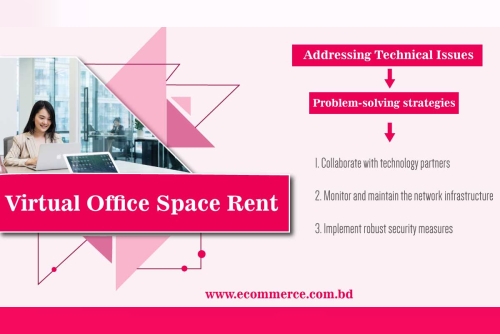The virtual office space rental market has grown exponentially in recent years. With more businesses adapting to remote work models and a globalized workforce, there is an increasing need for flexible office space solutions.
However, as the industry evolves, there are unique challenges that must be addressed to ensure a seamless experience for both the providers and users of virtual office spaces.
In this article, we will discuss the key challenges faced by the industry and explore problem-solving strategies to overcome them.
Let's start …
Addressing Technical Issues
One of the main challenges in the virtual office space rental market is ensuring the technological infrastructure can support seamless communication and collaboration. This includes reliable high-speed internet connections, efficient collaboration tools, and effective security measures to protect sensitive information.
Problem-solving strategies:
Collaborate with technology partners to ensure access to the latest tools and platforms.
Monitor and maintain the network infrastructure regularly to ensure consistent and reliable connections.
Implement robust security measures, including firewalls, encryption, and multi-factor authentication, to protect client data.
Catering to Diverse Needs
The virtual office space rental market caters to a wide variety of businesses, from startups to established enterprises. These diverse clients have unique needs in terms of office space and support services, such as reception, mail handling, and administrative assistance.
Problem-solving strategies:
Conduct thorough market research to understand the specific requirements of different client segments.
Develop tailored office space packages to cater to the needs of various businesses, from coworking spaces for startups to executive suites for established companies.
Offer a range of additional services, such as virtual receptionists and mail forwarding, to provide a comprehensive solution for clients.
Navigating Regulatory and Legal Challenges
Different countries and regions have their own regulations and legal requirements for virtual office spaces. Navigating these complexities can be a major challenge for providers, especially when operating in multiple jurisdictions.
Problem-solving strategies:
Consult with local legal and regulatory experts to understand the requirements in each market.
Develop a compliance strategy that takes into account the varying regulations across different regions.
Continuously monitor regulatory changes and update the compliance strategy accordingly to avoid potential legal issues.
Building and Maintaining Trust
Building trust with clients is crucial in the virtual office space rental market. Clients need to be confident that their business will be supported in a secure and professional environment, and providers must uphold their reputation for delivering on this promise.
Problem-solving strategies:
Provide transparent pricing and service offerings to avoid confusion and establish credibility.
Ensure excellent customer service and support to address any issues or concerns promptly.
Collect and showcase client testimonials and case studies to demonstrate the success of the virtual office space solution.
Adapting to Evolving Market Dynamics
The virtual office space rental market is continuously evolving, driven by changing business needs, technological advancements, and global trends. Providers must be able to adapt to these changes to stay competitive.
Problem-solving strategies:
Stay up-to-date on industry trends and best practices through continuous research and education.
Invest in innovation and explore new ways to improve the virtual office experience for clients.
Seek feedback from clients and use their insights to inform future developments and enhancements.
Conclusion
The virtual office space rental market presents significant opportunities for businesses and providers alike. To successfully navigate this growing industry, providers must be proactive in addressing potential challenges and delivering exceptional customer experiences.
By prioritizing customer support, offering customizable and scalable solutions, and continually adapting to the evolving needs of clients, virtual office space providers can set themselves apart in this competitive market.
Don't hesitate to call us to learn more about how our virtual office solutions can help your business thrive in today's dynamic work environment.
FAQ
Q: How is virtual office space rent different from traditional office space rent?
A: Virtual office space rent is different from traditional office space rent in that it does not involve renting a physical office space.
Instead, businesses rent virtual office services that allow them to have a professional presence without the expense and commitment of a physical office.
Q: Who can benefit from virtual office space rent?
A: Virtual office space rent can benefit a variety of businesses, including startups, remote workers, small businesses, and freelancers who need a professional presence but do not require a physical office space.
Q: What are the advantages of virtual office space rent?
A: The advantages of virtual office space rent include cost savings, flexibility, and a professional presence.
Virtual office space rent allows businesses to save on rent and other office expenses, provides the flexibility to work from anywhere, and gives them a professional image without the need for a physical office.
https://www.ecommerce.com.bd/addressing-the-challenges-overcome-way-to-renting-virtual-office-space/












